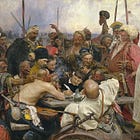The Muse has taken French leave, and so, rather than flowing like honey in August, my words resemble eighteen-wheelers crawling along Interstate 95, somewhere south of Springfield.1 (How’s that for a chauvinistic expression and a pair of parochial similes?)
Unlike so many other Substackers, I refuse to fill this void by writing about writing, writing about Substack, or writing about writing on Substack. Rather, I will avoid all three of these classic pitfalls by jumping into a fourth. That is, I will spill a bit of ink on the subject of the subjects covered in the Tactical Notebook.
Old readers (thank you!) know, and new readers (welcome!) will soon discover that many, if not most, of the pieces published in the Tactical Notebook have something to do with the First World War. To be more specific, if this publication has a center of gravity, it is not just the War to End All Wars, but the two years on either side of August 1914. So, there is more on the origins of Stosstrupp tactics than their use in 1918, more on the First and Second Balkan Wars (1912-1913) than the Fourth (1916-1918.)2
Within that center of gravity, there is another focus of efforts, a Schwerpunkt Schwerpunktorum, if you will. That, a quick tour d’horizon of our archive will show, is the French Army of the period in question.
In the world of military publishing, the easiest way to get rid of a pesky acquisitions editor (the book-trade equivalent of a recruiting sergeant) is to say, “I’d like to write something about French military history.” Indeed, the author who confesses to this “love that dares not speak its name,” has thirty seconds or so to mention Napoleon, Joan of Arc, or the Foreign Legion. If he fails to do this, the discussion will end, and the buyer of manuscripts will go the way of a pig in a piranha pond.
For years, I dealt with this prejudice by pasting generic titles (On Armor comes to mind) over works with more French content than the engine compartment of a Citroën. Now, thanks to Substack, no editor stands between me and my readers, and so I am free to, as the French say, sortir du placard. Indeed, lest there be any doubt about the matter, I will say plainly to the objects of my affection - Louis Baquet, Alexandre Percin, and André Laffargue - je vous aime … beaucoup!
Enough about me. Let’s spend a little time on the subject of the Tactical Notebook, and what it can you for you, Gentle Readers, in the third decade of the twenty-first century.
My justification for the attention that this blog pays to 1914 and its timely neighbors rests upon two similarities. When it comes to changes in the realm of technology, in age in which we live looks a lot like the last few years of the Belle Époque. (Compare, if you will, the pace of innovation experienced by “those magnificent men in their flying machine” with that of present-day drone masters.) Likewise, if we look at the structure of the international order, 2023 bears a strong resemblance to 2014. To be more specific, we live in an age where, thanks to an absence of ideological glue, alliances shift rapidly.
Consider, if you will, the situation in the South Caucasus, where, in 2020, Azerbaijan used drones, selfie tactics, and social media to conquer half of Nagorno Karabakh and, in the last few days, exploited alliance dynamics to finish the job. Think also of the ongoing war in Ukraine, where folks larping as Saga fans wield weapons donated by states that jail people for departing from the approved narrative on the Second World War.
For Further Reading:
I am told that Northern Virginia earned its abbreviation when, sometime in the sixteenth century, Spanish explorers sailed up the Potomac, climbed a hill, looked down upon the traffic on I-95 and exclaimed … “¡No va!”
Yes, I do want you to wonder about the Third Balkan War. That’s why I skipped over it.









Ah, you're not alone. Ian McCollum on his YouTube channel "Forgotten Weapons" frequently sneaks in videos about all the various French firearm development programs from the unpleasantness of 1870 right up to today. Proportionally, he _seriously_ over-represents French civilian and military weapons.
“Let’s spend a little time on the subject of the Tactical Notebook, and what it can you for you, Gentle Readers, as you stand in line for overpriced coffee in the third decade of the twenty-first century.” Well put, but please note that I, for one, largely read the Tactical Notebook at home, drinking my own coffee or that from local coffee places. Life is just too short for overpriced coffee, which usually isn’t that good anyway.